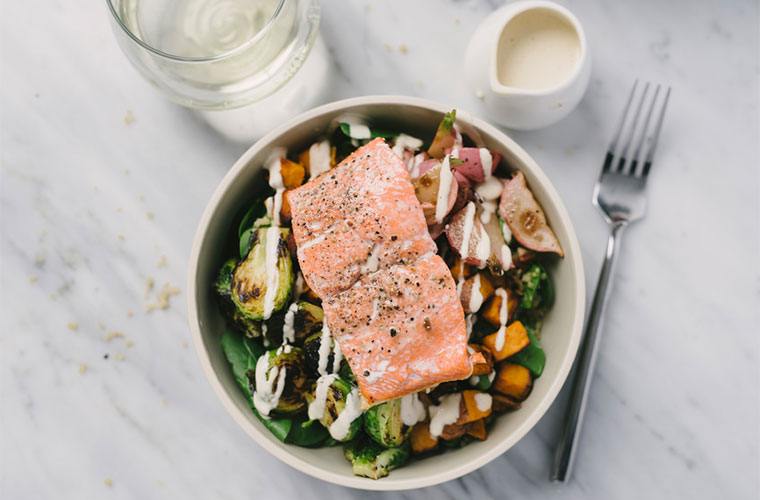But should you really add butter to your coffee? Are supplements the best way to get your fill of fatty acids? And can you OD on avocados? (Asking for a friend....) While fat is no longer demonized as a diet no-no, there are still a lot of misconceptions out there.
To set the record straight once and for all, I tapped Minimal Wellness nutritionist Rebecca Shern, RD, to answer the most pressing questions.
Keep reading for a complete rundown on the formerly shunned nutrient.

What counts as a "healthy" fat—and how much should you eat?
First things first: Is it unsaturated or saturated fat that you want to stay away from? Shern says it's all good. "The dietary guidelines shifted in 2015 and there's no longer a recommended cap on the intake of dietary fat," she says. That doesn't mean it's advisable to load up on frosted cupcakes—you still have to be mindful of what else is in what you're eating. If it's high in sugar and carbs as well, no dietician is going to bill it as healthy.
But there are certain foods that Shern recommends above others. "Avocados, olives—in both whole food and oil form—salmon, almonds, walnuts, chia seeds, and flax seeds are all excellent fat sources because they have high levels of omega-3s [AKA fatty acids], which are crucial for brain health," she says.
That doesn't mean it's advisable to load up on frosted cupcakes—you still have to be mindful of what else is in what you're eating.
But even then, you still have to think about what else is in a given ingredient. "You don't want to eat more than two servings of fish a week because of the mercury levels, for example," Shern points out.

{{post.sponsorText}}
And when it comes to foods high in fats and protein, like nuts, you want to be mindful of the protein content—too much and your body will end up storing it instead of using it.

What fats do for your body
So, about that fatty acid-fueled mind boost: “The science is very powerful in how they influence brain development,” says Drew Ramsey, MD, author of Eat Complete. According to the research he's seen, they literally help the brain to grow new brain cells—yes, for real!
Omega-3 is also fuel, Shern says. "We need it to give us energy—saturated fats in particular." Her go-to picks: egg yolks and coconut, including coconut oil.
The macronutrient's other perk? According to Shern, it keeps blood sugar levels stable and cuts cravings. "Fats are filling, so people end up eating less at each meal and not snacking as much between them," she says.
"Fats are filling, so people end up eating less at each meal and not snacking as much between them."
Considering how important they are to a nutritious diet, you'd think Shern would be all about popping fish oil pills to get extra servings, right? Wrong. "If you just rely on supplements for nutrients, what ends up happening is that you don't eat as healthfully as you would if you were prioritizing getting those nutrients in their whole food source," she says.
The takeaway: Stick to whole foods to get the most nutritious servings of this key nutrient. And hey, if that means adding more avocado to your life—on toast, in soups, or how about this dreamy avo-coffee smoothie—that sounds like a serious win-win.
Originally posted March 17, 2017. Updated July 17, 2018.
Put these learnings to the test by fueling up pre-workout on these fat-dense energy balls. And speaking of nutrition myths, here's what you need to know about hydration.
Loading More Posts...